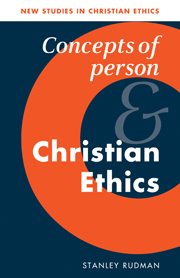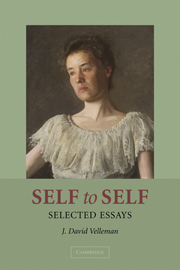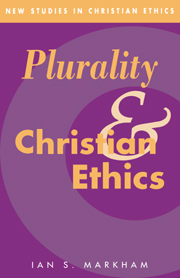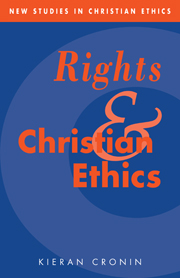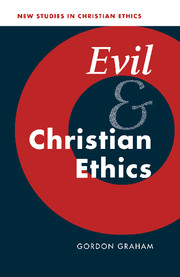Concepts of Person and Christian Ethics
Should "personhood" or its perceived absence determine the allocation of scarce medical resources? This and other issues make the concept and definition of personhood central to current debates over ethics. In a wide-ranging discussion notable for its clarity, Stanley Rudman traces the development of modern ideas about personhood. Arguing against those who define persons by purely moral and rational criteria, he posits an ethic that instead understands personhood in relation to other people, to the environment, and to God.
- Deals in a clear, accessible way with an important current issue of ethics
- Thoughtfully compares aspects of modern philosophy and Christian ideas
- Establishes connections between early Christian views of the person of God and modern Christian ethics in an original way
Reviews & endorsements
"...this work represents an intriguing and compelling start toward an expansion of the meaning of person and a greater interchange between Christian and secular ethics. ...it has great promise and deserves a close and critical reading."
Product details
November 2008Paperback
9780521090247
424 pages
216 × 140 × 24 mm
0.54kg
Available
Table of Contents
- Part I. 'Person' in Contemporary Ethics:
- 1. 'Une Cátegorie de l'Esprit Humain: La Notion de Personne'
- 2. Meaning and criteria: person/human being
- 3. Moral personhood in M. Tooley and P. Singer
- 4. Personal identity and responsibility in D. Parfit
- 5. Human subject and human worth
- 6. Resituating personhood: embodiment and contextuality
- Part II. 'Person' in Christian Perspective:
- 7. The relevance of history and Christology
- 8. Divine embodiment and temporality: is God a person?
- 9. Divine and human: relationality and personhood
- 10. Religion and morality: personhood, revelation and narrative
- Part III. Implications for a Christian Ethic:
- 11. A communicative ethic: Hauerwas and Habermas
- 12. A community of ethical difference: including the 'other'
- 13. The logic of superabundence: an ethic of forgiving love
- 14. The religious ground of human rights
- 15. The integrity and transformation of creation
- Conclusion
- Bibliography
- Indices.

